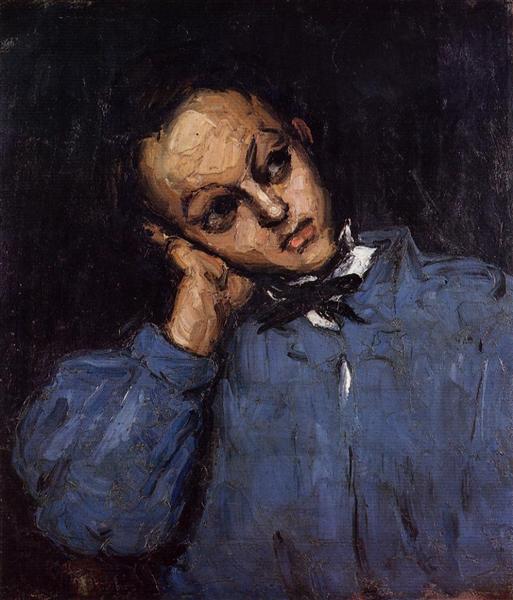Description
Paul Cézanne's painting Portrait of a Young Man (1866) stands as a fascinating testament to the artist's early development and his search for a pictorial language that would fuse tradition with modernity. Encapsulating the essence of a young man with his intense gaze and contemplative pose, this work invites us to delve into an exploration not only of the figure depicted, but also of the evolution of portraiture in the context of 19th-century art. Cézanne, a Post-Impressionist pioneer, manages, through this painting, to present a subtle balance between reality and personal interpretation.
Visually, the portrait is characterised by a colour palette that moves between warm and cool tones, with a predominance of blues that provide a serene and peaceful atmosphere. The interaction of these colours not only defines the young man's form, but also establishes an emotional dialogue with the viewer. The skin of the subject, although evidenced by a technique of visible brushstrokes that blur the contours, reveals a luminosity that contrasts with the background. This use of light is essential in Cézanne's work, who moves away from the strong shadows typical of Romanticism, preferring a clearer and softer modelling.
Cézanne employs a composition reminiscent of classical portraiture, but transforms it through simplicity and economy of detail. The young man, shown half-length, is positioned slightly in profile, creating a sense of immediacy and connection. The arrangement of his face, with an introspective gaze, suggests a psychological depth that challenges the viewer to contemplate not only the figure, but its inner world. This focus on the expression of individuality was one of Cézanne's most important innovations, anticipating many of the later explorations of modern portraiture.
The work has no specific title designating the young man portrayed, allowing for a more universal relationship between the viewer and the figure. This feature also reflects Cézanne's interest in form, structure, and color rather than personal narrative. The figure's surroundings are minimal, which focuses all attention on the portrait itself, emphasizing the young man's physical qualities and presence. The choice of clothing, a simple dark outfit, reinforces the portrait's sobriety, while the more vibrant colors of the skin and head highlight his humanity.
Historically, Portrait of a Young Man is set within a period in which Cézanne began to consolidate his own style, one that would differentiate him from his contemporaries and place him as a precursor of modern art. In the context of 19th-century painting, Cézanne challenged traditional techniques by fragmenting form and displacing traditional perspective, aspects that can be glimpsed in his later works. This painting is an outline of the journey that would lead him to the development of what we know today as the language of Cubism.
In conclusion, Paul Cézanne's Portrait of a Young Man is a clear reflection of the painter's mastery in exploring color and form, as well as his ability to capture the emotional essence of his subject without resorting to an explicit narrative account. This work not only provides us with a window into the artist's personal vision, but also marks a significant milestone in the evolution of portraiture in art history, highlighting his legacy as one of the most influential in the transition to modern art.
KUADROS ©, a famous painting on your wall.
Hand-made oil painting reproductions, with the quality of professional artists and the distinctive seal of KUADROS ©.
Painting reproduction service with satisfaction guarantee. If you are not completely satisfied with the replica of your painting, we will refund 100% of your money.

